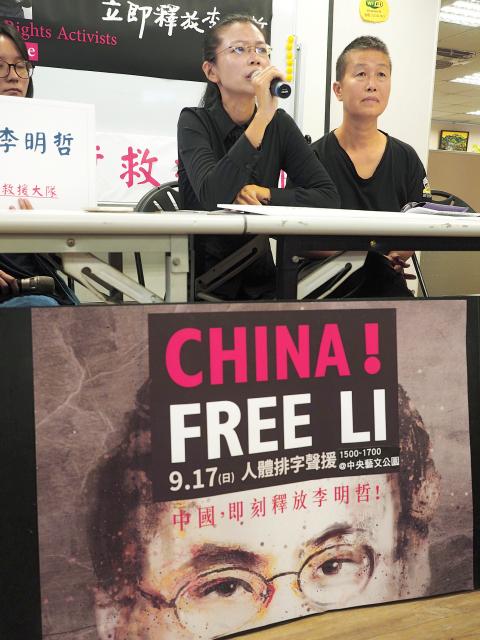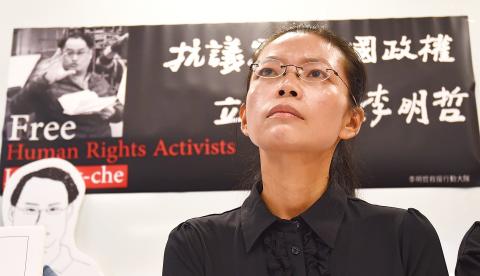Lee Ching-yu (李凈瑜) — wife of Taiwanese human rights advocate Lee Ming-che (李明哲), who is imprisoned in China on charges of subversion — yesterday said her husband might be pressured into pleading guilty when his trial opens tomorrow.
“At this moment, I want to ask my compatriots for their understanding if they see him do or say anything unbearable in court outside of his free will,” she told a news conference in Taipei. “This is just the Chinese government being adept” at forcing confessions, she said.
She said she would attempt to enter China on a landing visa today, as moves by the Chinese government have thrown her invitation to observe her husband’s trial into doubt.

Photo: EPA
The Mainland Affairs Council, which has been helping arrange plane tickets and travel documents, has advised her to attempt to enter China on a landing visa, following the failure of an application for a new “Taiwan Compatriot Permit” after she refused to renew contact with her husband’s Chinese-appointed lawyer, she said.
She said a man named Zhang Zhongwei (張忠偉) called her on Thursday to inform her of her husband’s impending trial at the Intermediate People’s Court in Yueyang, Hunan Province, instructing her to immediately apply for travel documents.
“As I do not acknowledge the validity of the Chinese court, I will not get involved in legal details other than asking the time and location of the trial, because I want to see my husband,” Lee Ching-yu said. “I am not going to participate, I am going to see my husband and tell him I stand with him.”

Photo: Liu Hsin-de, Taipei Times
Her previous Taiwan Compatriot Permit was revoked by Beijing in April, which prevented her from flying to China to search for her husband.
Judicial Reform Foundation executive secretary Hsiao I-ming (蕭逸民) said that he, former Democratic Progressive Party legislator Wang Li-ping (王麗萍), one unnamed human rights advocate and officials from the council and the Straits Exchange Foundation (SEF) have sent official applications to China’s Taiwan Affairs Office to accompany Lee Ching-yu to the trial, but the prospects look bleak.
“We will not attempt to attend or get close to the trial site as private individuals, because that would very likely result in a second Lee Ming-che. We will go only if we receive official permission,” Wang said, adding that she had directly contacted the Yueyang court.
The court said that while Lee Ming-che is to be given an “open” trial, Taiwanese may only observe if they receive permission from the Taiwan Affairs Office, she said.
“Under Chinese law, only close relatives — namely Lee Ming-che’s wife, mother and father — have a right to attend, and it looks like authorities will not permit anyone else, including SEF officials,” Wang said.
“While they are saying this is an open trial, that is not the truth if they are only going to let their own people observe,” Taiwan Association for Human Rights secretary-general Chiu Ee-ling (邱伊翎) said, echoing advocates’ charges that China is taking steps to ensure its full control over a show trial.
“In choosing to put on an open trial, the signal they are sending is that Lee Ming-che is going to make a public confession. The Chinese lawyer’s manipulation of his mother is just more proof that this is all a show,” Wang said.
She was referring to reports on Friday that Lee Ming-che’s mother, who is in her 70s and has never appeared publicly in connection with the case, had suddenly applied through the council to attend the trial.
Lee Ching-yu confirmed that she had sent the council a message in an attempt to prevent her mother-in-law’s attendance at the trial.
“My objective was to save a desperate situation and stop a humiliating show,” she said.
Lee Ming-che’s mother has a “different political stance” from her son and daughter-in-law and has called on her son to “apologize to his Chinese mother country” after learning of his detention, Wang said.
She also threw out his collection of books and political materials during Lee Ching-yu’s trip to the US in May, she added.
While Lee Ming-che has been charged with attempting to overthrow the Chinese government, Lee Ching-yu has maintained that he was visiting China to share Taiwan’s “experience of democratization” with Chinese friends.
The Chinese government has apparently decided to wrap up Lee Ming-che’s case prior to the Chinese Communist Party’s 19th National Congress next month, even though a final outcome remains uncertain, Wang said.
“The problem is that his mother’s paperwork has gone through, but ours has not,” Wang said. “Chinese authorities seem to be making participation dependent on whether Lee Ching-yu will play their assigned role for her.”
While the council requested that Lee Ching-yu contact her husband’s lawyer, its advice that she pursue a landing visa demonstrates that it has had some contact with Chinese authorities, despite official avowals to the contrary, Wang said, adding that Lee Ching-yu rejected its requests because her husband’s case is a “political question.”
Chiu said that she and Covenants Watch chief executive officer Huang Yi-bee (黃怡碧) are to still meet tomorrow for an initial UN Human Rights Council Working Group on Enforced or Involuntary Disappearances meeting on Lee Ming-che’s case.
The sudden announcement and timing of his trial have effectively forestalled Lee Ching-yu’s participation at the meeting, she added.
Additional reporting by CNA and AP

CHAOS: Iranians took to the streets playing celebratory music after reports of Khamenei’s death on Saturday, while mourners also gathered in Tehran yesterday Iranian Supreme Leader Ayatollah Ali Khamenei was killed in a major attack on Iran launched by Israel and the US, throwing the future of the Islamic republic into doubt and raising the risk of regional instability. Iranian state television and the state-run IRNA news agency announced the 86-year-old’s death early yesterday. US President Donald Trump said it gave Iranians their “greatest chance” to “take back” their country. The announcements came after a joint US and Israeli aerial bombardment that targeted Iranian military and governmental sites. Trump said the “heavy and pinpoint bombing” would continue through the week or as long

TRUST: The KMT said it respected the US’ timing and considerations, and hoped it would continue to honor its commitments to helping Taiwan bolster its defenses and deterrence US President Donald Trump is delaying a multibillion-dollar arms sale to Taiwan to ensure his visit to Beijing is successful, a New York Times report said. The weapons sales package has stalled in the US Department of State, the report said, citing US officials it did not identify. The White House has told agencies not to push forward ahead of Trump’s meeting with Chinese President Xi Jinping (習近平), it said. The two last month held a phone call to discuss trade and geopolitical flashpoints ahead of the summit. Xi raised the Taiwan issue and urged the US to handle arms sales to

State-run CPC Corp, Taiwan (CPC, 台灣中油) yesterday said that it had confirmed on Saturday night with its liquefied natural gas (LNG) and crude oil suppliers that shipments are proceeding as scheduled and that domestic supplies remain unaffected. The CPC yesterday announced the gasoline and diesel prices will rise by NT$0.2 and NT$0.4 per liter, respectively, starting Monday, citing Middle East tensions and blizzards in the eastern United States. CPC also iterated it has been reducing the proportion of crude oil imports from the Middle East and diversifying its supply sources in the past few years in response to geopolitical risks, expanding

Pro-democracy media tycoon Jimmy Lai’s (黎智英) fraud conviction and prison sentence were yesterday overturned by a Hong Kong court, in a surprise legal decision that comes soon after Lai was jailed for 20 years on a separate national security charge. Judges Jeremy Poon (潘兆初), Anthea Pang (彭寶琴) and Derek Pang (彭偉昌) said in the judgement that they allowed the appeal from Lai, and another defendant in the case, to proceed, as a lower court judge had “erred.” “The Court of Appeal gave them leave to appeal against their conviction, allowed their appeals, quashed the convictions and set aside the sentences,” the judges